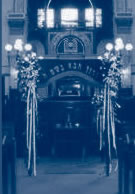|
SEDRA : Tazria Shabbat Hachodesh Hertz
Chumash p. 460 Leviticus Chap. 12-15
This week's Sedra is generously sponsored by Gary Hershan.
SYNOPSIS:
Further aspects of the Laws of spiritual or ritual purity
and impurity - TAHARAH and TUM'AH - introduced in the previous
sedra, Shemini, i.e. the dietary regulations of kashrut are
now discussed.
The conditions attendant on childbirth render the mother
NIDDAH - ritually impure - seven days for the birth of a boy
and fourteen days for a girl.
This condition rendered the mother ineligible to enter the
Sanctuary precincts. After an additional thirty three days
for a boy and sixty six days for the birth of a girl the purification
period was completed and the mother would bring burnt and
sin offerings to the Sanctuary.
Reference is also made to the circumcision of a male child
to occur on the eighth day to inaugurate him into the Covenant
- BRIT - which G-D made with Abraham.
Moses & Aharon are commanded concerning the regulations
and measures to be taken in the case of METZORAH - a skin
disease (whilst some consider the disease to be leprosy, this
is not conclusive).
Anyone who contracted the disease was not permitted to enter
the Sanctuary. Thus, when one noticed certain skin disorders
he was to approach the Kohen for an examination. If, after
examining the rash or spots on the person's skin, the Kohen
was unable to give a definitive verdict as to the nature of
the disorder, the person was isolated for seven days after
which he was re examined. Where there was no change the Kohen
ordered an additional seven days of quarantine.
Then a final diagnosis was made. If the disorder had not spread,
the person was TAHOR, ritually pure. If the blemish had spread
he was declared Metzorah. This meant he had to live outside
the camp of Israel and was to dress and behave in a manner
which would warn others not to come into contact with him.
When the disease healed, the Kohen again examined the person
and if the recovery was complete he would undertake a ritual
of purification. This elaborate process took place over an
eight day period with special rites being observed on the
first and last days. These included washing, bathing and laundering
his clothes.
O n the eighth day he brought three sacrifices : a guilt offering,
a sin offering and a meal offering. A poor man could bring
smaller sacrifices.
The person was then pronounced Tahor (pure) and could resume
living as part of the community - society again.
The laws of Tzara'at also applied to garments and buildings.
Here too, the investigations as to the ritual fitness of the
article or building would be conducted by the Kohen. Garments
with tzara'at were burnt. Houses with signs of tzara'at were
evacuated and boarded up for seven days.
If the contamination spread the affected parts were removed
and replaced. If the tzra'at still persisted the building
was demolished. All the materials were removed from the site
to a specially designated dump outside the camp.
SPECIAL MAPHTIR - HACHODESH HERTZ CHUMASH P. 253 Exodus
Chap. 12
The Maphtir introduces the month of Nisan, month of redemption
and is a major source of the laws of Passover.
THE HAPHTORAH - HACHODESH HERTZ CHUMASH P. 1001 Ezekiel
Chap. 45 16
Ezekiel describes the Temple rebuilt in the "New Jerusalem"
and makes particular reference to the Passover sacrifices.
This continues the theme of the special Maphtir for Shabbat
Hachodesh.
TELL ME RABBI ..... THE MONTH OF NISSAN
"This month shall be for you the beginning of months;
it shall be the first month of the year for you" (Shemot
12:2)
The world was created in Nissan (Rosh Hashanna 11)
"This month shall be for you the beginning of months":
The Jewish people consider Nissan as the first month, and
all other months, the second, the third, etc., should be counted
according to it. Each time we count the months, we also remember
the miracle of the Exodus. This is why the months have no
name in the Torah for example "the third month",
"in the second year, in the second month, the cloud was
lifted" (Bamidbar 10:11); "and on the first day
of the seventh month" (Bamidbar 29:1), and so on with
all the months.
In a similar way we remember the Sabbath day, by counting
the days of the week in accordance to it. However, when reckoning
years, we do not count from Nissan but from Tishre. (Ramban,
Parshat Bo). The names "Tishre", "Nissan"
etc. originated during the time of the Persian/Babylonian
exile.
Nissan is the month of redemption. In this month our forefathers
were redeemed from Egypt, and in this same month the Jewish
people will eventually be redeemed again, hopefully soon in
our days. In this month our forefathers Abraham, Yitzchak
and Yaacov were born (according to Rabbi Yoshua's opinion),
and the Mishkan (Tabernacle) was set up (Shemot 40:2). Also,
the princes of each tribe brought their offerings for the
dedication of the mishkan. (Rosh Hashanna 11).
CUSTOMS FOR THE MONTH OF NISSAN
During the time of the Bet Hamikdash, our sages established
the rule to teach the people thirty days before any one of
the three festivals regarding its laws, so from Purim onwards,
we begin studying the laws of Pesach.
It is customary to omit those additional prayers which are
mournful or supplicatory since Nissan is the month of redemption.
This is also based on the fact that on the completion of the
Mishkan on the first of Nissan the princes of the tribes began
offering their korbanot (sacrifices) for the dedication of
the altar, one prince each day, until the 13th of Nissan.
Each prince made a celebration on the day of his offering.
On the eve of Pesach the whole of Israel rejoiced, as they
all brought the Pesach offering. After this follow the eight
days of Pesach. Except for the 13th of Nissan, which has no
special event, and the last few days of Nissan, most of the
month was spent in holiness. Thus the whole month is considered
a `Yom Tov' a period of Joy.
KIMCHA D'PISCHA - "flour for Pesach"
It was customary to buy wheat to distribute among the poor
before Pesach in order to enable them to have Matzot for the
Festival. This custom is particularly apt for our Festival
of Freedom when we recline and relax as a sign of prosperity.
It is an affront to G-d, if at such a time we ignore the plight
of those who are in need. Today various funds exist in Jewish
communities to enable families in need to buy supplies required
for Pesach and the Seder.
Congregants wishing to contribute locally should get in touch
with Rabbi.
BACK TO SHABBAT SHALOM
TABLE
|








